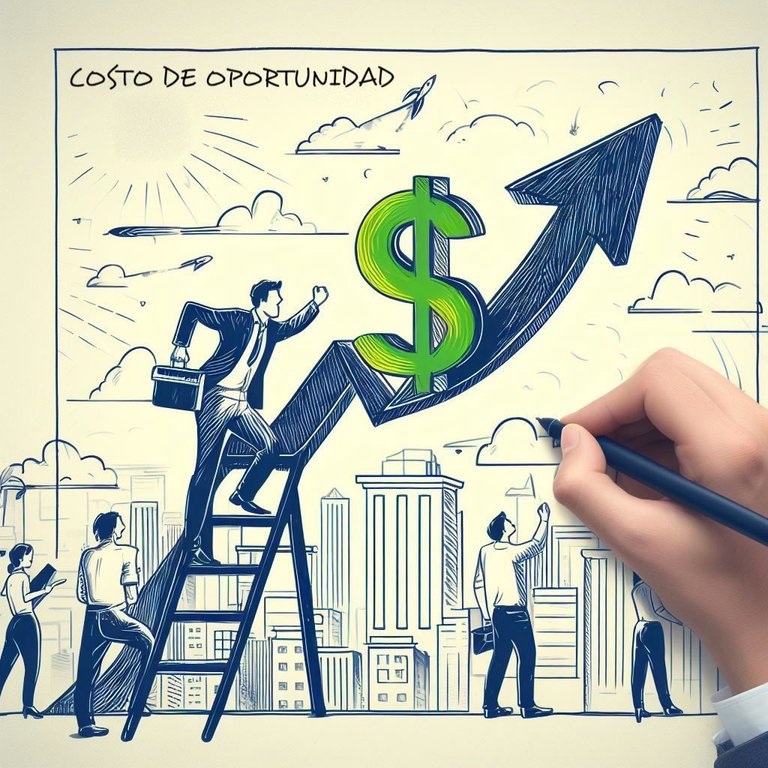

Hace unos días les hablé del interés compuesto y los invité a enamorarse de él. Hoy, corresponde hablar del costo de oportunidad.
Cuando se trata de tomar decisiones, la norma apunta a que sean decisiones informadas. Es decir, que sean el producto de una evaluación previa que contemple los aspectos tanto positivos como negativos de cada opción. En las finanzas, en particular en las inversiones, dicha evaluación contempla lo referido al costo de oportunidad.
Entonces, ¿qué es exactamente el costo de oportunidad? Pues bien, en términos simples y sencillos, es aquello que hemos dejado de ganar cuando optamos por una opción de inversión en lugar de haberlo hecho por otra. El costo de oportunidad no es más que el beneficio perdido, lo que pudo ser y no fue, lo que habría pasado si…, lo que pudimos haber ganado de haber tomado una decisión diferente. Veámoslo como el precio que pagamos por dejar pasar el tren de la oportunidad.
Para entender esto en un contexto estrictamente financiero, consideremos el siguiente ejemplo: Supongamos que tenemos $100 para invertir y tenemos la opción de comprar HIVE a $0.35 o comprar HBD a $1. Si elegimos comprar HBD, podríamos obtener un APR del 20%, o un APY del 21.93% si ya nos hemos enamorado del interés compuesto. Eso, se traduciría en unas ganancias anuales de $20 ó $21.93, según sea el caso. Sin embargo, si el precio de HIVE se duplica de $0.35 a $0.70 en ese mismo período de tiempo como respuesta a un eventual bull market, entonces habremos dejado de ganar $100 con respecto a la inversión inicial. Es decir, en cristiano, por ganarnos $20 habremos dejado de ganarnos $100. Fíjense, que digo: “hemos dejado de ganar”; y no: “hemos perdido”. Pues eso es precisamente el costo de oportunidad, lo que hemos dejado de ganar.
ENGLISH VERSION
A few days ago, I talked to you about compound interest and invited you to fall in love with it. Today, it's time to talk about the opportunity cost.
When it comes to making decisions, the norm is that they should be informed decisions. In other words, they should be the result of a prior evaluation that considers both the positive and negative aspects of each option. In finance, particularly in investments, this evaluation includes what is referred to as the opportunity cost.
So, what exactly is the opportunity cost? Well, in simple terms, it's what we have foregone when we choose one investment option over another. The opportunity cost is nothing more than the lost profit, what could have been but wasn't, what would have happened if... what we could have gained if we had made a different decision. Think of it as the price we pay for letting go of the opportunity train.
To understand this in a strictly financial context, consider the following example: Suppose we have $100 to invest, and we have the option to buy HIVE at $0.35 or buy HBD at $1. If we choose to buy HBD, we could earn an APR of 20% or an APY of 21.93% if we've already fallen in love with compound interest. That would translate to annual earnings of $20 or $21.93, as the case may be. However, if the price of HIVE doubles from $0.35 to $0.70 in the same period as a response to a potential bull market, then we will have missed out on earning $100 compared to the initial investment. In other words, in plain terms, we would have missed out on earning $100 for the sake of making $20. Notice that I say: "we have stopped earning"; and not: "we have lost". For that is precisely the opportunity cost, what we have stopped earning.

Lo anterior es solo un ejemplo entre el vasto universo de casos y escenarios en los que está presente el costo de oportunidad, el cual valga decirse, no siempre obedece a una mala elección, sino a nuestra percepción del riesgo. Seamos honestos, en términos de ganar, todos queremos apuntar a aquello que genere mayor ganancia; sin embargo, ambicionar un crecimiento rápido puede ser muy arriesgado, especialmente en un mercado tan volátil como el mercado de las criptomonedas. Lo más sensato en estos casos, es invertir de forma más segura y menos arriesgada. Esos deportes extremos podríamos dejarlo para los más experimentados en el campo de las finanzas y las inversiones. Sin embargo, siempre es oportuno recordar la premisa que mencioné en mi post anterior, y es que “a menor riesgo, menor ganancia, y viceversa.”
Pues bien, cada vez que nosotros optamos por una alternativa en lugar de otra, nos enfrentamos al costo de oportunidad. Cuanto más se acerque a cero o sea negativo, más confiados y seguros estaremos que haber tomado la mejor decisión. Caso contrario, cuanto más alto sea, más razones para lamentarnos de no haber tomado una decisión diferente.
Pero ojo, el costo de oportunidad no está presente solo en lo referido a las finanzas; la verdad, es que está presente en muchos otros aspectos de nuestras vidas, y no siempre se trata de algo tangible o cuantificable, aunque para efectos de esta publicación así sea. La realidad es que siempre que tomamos decisiones y elegimos una opción sobre otra, nos exponemos al costo de oportunidad. Veámos un nuevo escenario: ¿Ir a la playa o al cine? Nos fuimos al cine y se fue la luz, no vimos la película. Si hubiesemos elegido ir a la playa, nos ahorramos el mal rato, y adicionalmente, habríamos disfrutado de un hermoso día soleado.
ENGLISH VERSION
The above is just one example among the vast universe of cases and scenarios where the opportunity cost is present. It's worth noting that it doesn't always result from a poor choice but from our perception of risk. Let's be honest, when it comes to making money, we all want to aim for what generates the most profit. However, aiming for rapid growth can be very risky, especially in such a volatile market as the cryptocurrency market. In such cases, the most sensible approach is to invest more safely and with lower risk. Leave the extreme sports to the experts in the field of finance and investments. However, it's always worth remembering the premise I mentioned in my previous post, which is "lower risk, lower reward, and vice versa."
So, every time we choose one alternative over another, we face the opportunity cost. The closer it gets to zero or turns negative, the more confident and secure we will be that we made the best decision. Conversely, the higher it is, the more reasons we have to regret not making a different decision.
But remember, the opportunity cost is not only present in financial matters; the truth is that it's present in many other aspects of our lives, and it's not always something tangible or quantifiable, although, for the purposes of this publication, it may be. The reality is that whenever we make decisions and choose one option over another, we expose ourselves to the opportunity cost. Let's consider a new scenario: "Go to the beach or to the cinema?" We chose to go to the cinema, and the power went out, so we couldn't watch the movie. If we had chosen to go to the beach, we would have saved ourselves the unpleasant experience, and additionally, we would have enjoyed a beautiful sunny day.

No olvidemos nunca nuestra condición humana; por tanto, no pasemos por alto que nuestras decisiones suelen estar influenciadas más por las emociones que por la razón. De manera que, en ocasiones no se trata solo de ganar más, sino de perder menos. ¿Esto que quiere decir? Que lo que se deja de ganar en términos monetarios, a veces, se gana en tranquilidad y paz. Un alto costo de oportunidad bien podría interpretarse como una “pérdida” significativa de oportunidad, ya saben “lo que dejamos de ganar”, pero tal vez podría resultar ser muy positivo a largo plazo si con ello se contribuye a nuestra paz y salud mental.
Como verán mis estimados, el costo de oportunidad no trata en ningún momento de lo que perdemos, sino de lo que dejamos de ganar. Literalmente es un “menos es más”.
ENGLISH VERSION
Let's never forget our human nature; therefore, let's not overlook the fact that our decisions are often influenced more by emotions than by reason. So, sometimes it's not just about earning more but about losing less. What does this mean? What is lost in terms of money can sometimes be gained in peace and mental well-being. A high opportunity cost could well be interpreted as a significant "loss" of opportunity, you know, "what we forgo gaining," but it might turn out to be very positive in the long run if it contributes to our peace and mental health.
As you can see, my dear readers, the opportunity cost is never about what we lose but about what we miss out on gaining. It's literally a "less is more" concept.

Translation: DeepL Translate.
Imágenes generadas por la IA Dall-E 3 integrada en Bing.
Images generated by the Dall-E 3 AI integrated with Bing.


Posted Using InLeo Alpha
Concuerdo con el título de esta publicación y efectivamente no es lo mismo, aunque igual se siente feo cuando te das cuenta que dejaste de ganar más, por andar de momia jajaja. Muchas veces escuchamos e incluso lo hemos dicho "ay, cambié a tanto y subió, perdí" y no, no perdimos, solo dejamos de ganar más.
Correcto, vender a un precio y que luego suba no es perder, es dejar de ganar. Perder es cuando vendes por debajo del precio de compra, allí si se materializa la pérdida. Aunque ciertamente, duele mucho vender barato jajaja
Que si no jajajaja, de que duele duele, así como tener un token, regalarlo porque no vale nada y luego ver cómo se dispara su valor, ay no, mejor no sigo con estos recuerdos de Vietnam 🤯😅
De esos recuerdos no se escapa, nos persiguen por siempre jajaja
Hola buenas noches como estas yo lo hago en binance.. Dejo mis cripto que ganen intereses
Si esos intereses ganados los reinviertes y sumas al capital, estás disfrutando del interés compuesto. Ahora, en cuanto al costo de oportunidad, te enfrentas a él si los tokens que tienes en staking en algún momento suben mucho de precio y pierdes la oportunidad de venderlos en ese momento, esa "oportunidad perdida" es el costo de oportunidad.
Tengo varios criptos generando intereses
Yo no lo llamaría Costo de Oportunidad, sino Costo por ser pendejo ja, ja, ja, a veces las emociones nos hacen tomas las peores decisiones, hay que ser muy lógicos con las finanzas.
Y la ansiedad jajajaja
Te consume jajaja.
Hay que reescribir los textos, el costo por ser pendejo suena más acertado jajajaja
Hola. Excelente reflexión que, como bien dices aplica para todos los ámbitos de la vida.
Son conceptos que existen y es bueno saber de ellos para ponerle titulo a eso que nos pasa o a lo que estamos expuestos muchas veces.
Opportunity cost controls what we want to buy and also helps to regulate our expenses
Not necessarily, it is simply the value of the lost opportunity, or the lost profit in any case. I repeat, it is that which could have been but was not.
Congratulations @gorayii! You have completed the following achievement on the Hive blockchain And have been rewarded with New badge(s)
Your next target is to reach 40000 upvotes.
You can view your badges on your board and compare yourself to others in the Ranking
If you no longer want to receive notifications, reply to this comment with the word
STOPTo support your work, I also upvoted your post!
Check out our last posts:
This is exactly the way we have seen that HBD has supported people within the market by giving them a lot of APR and they have spent a lot of time in the bear market.